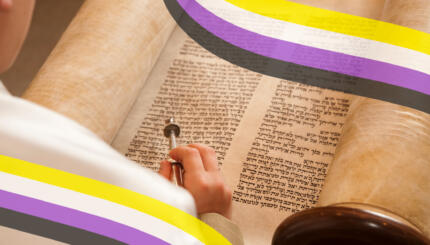The very first intimations of the wrestle with reality may come long before the crucial birthday, as the family seeks to choose a date for the synagogue ceremonial:
-How does the birthday work with family needs, school schedules, the timing of other bar/bat mitzvah celebrations at the same congregation?
– Does the family already have ties to a congregation that will organically become the venue for the ceremony, or does it need to choose a congregation, or even create an ad hoc one to meet its needs most authentically?
-How do Jewish teachings and practices themselves interact with the family’s situation?
With your help, My Jewish Learning can provide endless opportunities for learning, connection and discovery.
For example, how does the youngster feel about the content of the various possible Torah portions and haftarot [weekly prophetic portions]? Would s/he like to choose a date according to the Torah content, rather than accept the content that comes with the date? Does s/he want to read some part of the weekly portion other than the conventional maftir (the last few lines of the portion), because s/he finds the alternative passage more meaningful, more life-connected?
If crucial family members and friends reside elsewhere and live in accordance with the traditional practice of not traveling on Shabbat [Sabbath], might the whole thing be easier if it is set not on Shabbat but on a Monday that is a secular holiday (like Labor Day or Memorial Day), since traditionally the Torah is read on Monday and Thursday mornings as well as Shabbat?
Might the family want to set the Torah reading in the late-afternoon Shabbat service (when traditionally the beginning of the Torah portion for the next Shabbat is read), then celebrate the end of Shabbat with the Havdalah ceremony [that distinguishes between the end of Shabbat time and the beginning of everyday time], and then move into a Saturday-night party?
What seems the simple matter of setting the date may thus become the family’s first revelation of its journey into a new understanding of itself, its community, Judaism and the Jewish people, its relationship to God, or some other way of talking about wholeness.
Excerpted with permission from A Time for Every Purpose Under Heaven (Farrar, Straus and Giroux, LLC).
bat mitzvah
Pronounced: baht MITZ-vuh, also bahs MITZ-vuh and baht meetz-VAH, Origin: Hebrew, Jewish rite of passage for a girl, observed at age 12 or 13.
Havdalah
Pronounced: hahv-DAHL-uh, Origin: Hebrew, From the root for "to separate," the ceremony marking the end of Shabbat and the beginning of the week.
mitzvah
Pronounced: MITZ-vuh or meetz-VAH, Origin: Hebrew, commandment, also used to mean good deed.
Shabbat
Pronounced: shuh-BAHT or shah-BAHT, Origin: Hebrew, the Sabbath, from sundown Friday to sundown Saturday.
Torah
Pronunced: TORE-uh, Origin: Hebrew, the Five Books of Moses.



